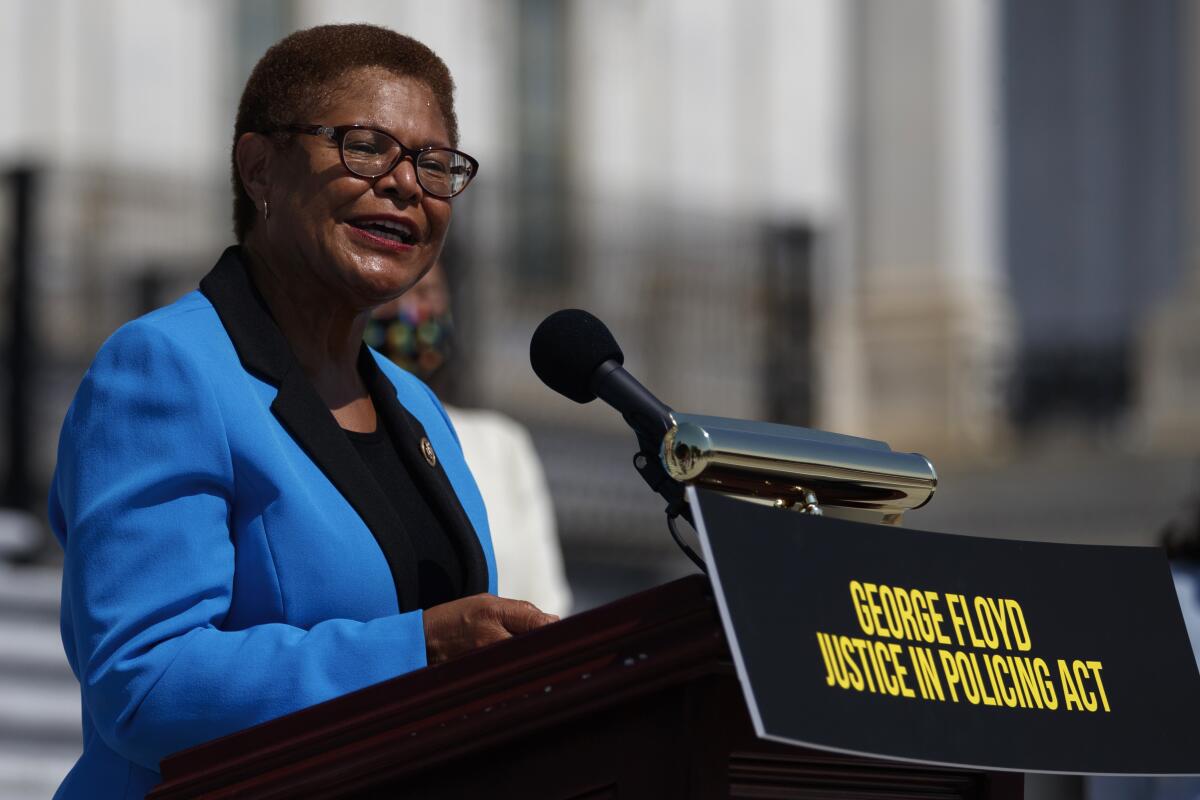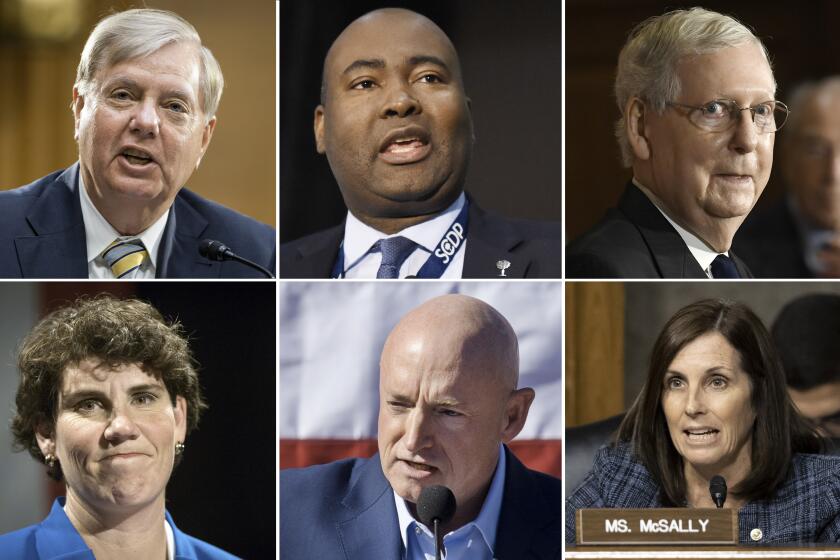L.A. Rep. Karen Bass surged up Biden’s VP list. Is she ready for the national stage?

- Share via
WASHINGTON — Los Angeles Rep. Karen Bass is an unlikely contender for vice president.
The five-term congresswoman has never run for statewide office, much less a national one; she hasn’t faced a tough reelection race in her comfortably liberal district.
Until recently, Bass was scarcely known outside California. And if the 66-year-old leader of the Congressional Black Caucus harbored further political ambitions, she didn’t share them, friends and colleagues say.
Bass catapulted onto Joe Biden’s shortlist for a running mate thanks largely to her pragmatism and unassuming style, which have earned the respect of progressives, moderate Democrats and even some Republicans, including House Minority Leader Kevin McCarthy (R-Bakersfield).
But for a Biden campaign looking to “do no harm” at a time when he enjoys a substantial lead in polls against President Trump, Bass also carries risk.
Alongside the friendly, cooperative demeanor that has made Bass so popular on Capitol Hill is a political ideology significantly to the left of Biden’s or several of the other women under consideration. Her record could raise concerns in key swing states Democrats need to win. As a member of the Congressional Progressive Caucus, for example, she supports the Green New Deal and Medicare for All measures, while Biden has called for more moderate alternatives.
Her long-standing interest in Cuba — including as many as 15 trips to the island beginning as a community activist in the 1970s and continuing after her election to the House — could prove politically toxic in Florida, which has a large, active population of anti-Castro refugees. Polls indicate that Biden is leading Trump in the state, and a victory there would all but clinch the election for Biden, making the state a prime concern for his campaign.
And Bass’ lack of national or statewide campaigns means that none of her political vulnerabilities has been tested in a tough contest. If selected, Bass’ relative political obscurity guarantees a scramble by Democrats and Republicans to be the first to define her for voters, potentially bringing to light items from her past that could prove troublesome for a Democratic ticket.
A Times review of her campaign finances, for example, revealed that she nearly doubled her 2010 income with consulting fees paid by a community nonprofit that she founded and to which her reelection campaign gave money.
Bass and her allies acknowledge her political ascent has been unconventional. Before winning a seat in the state Assembly in 2004, she worked as a physician assistant and was on the USC faculty; she co-founded the Community Coalition in 1990 to address the crack cocaine epidemic and later, the 1991 police beating of Rodney King.
“My resume doesn’t look like a resume of somebody that would be in the position I am in today,” Bass said in an interview, stressing that she hasn’t lived her life looking over her shoulder in anticipation of being vetted for higher political office.
She said she attributes her ability over the years to forge strong working relationships, even with opponents, to the fact that she has viewed “fighting for social and economic justice as my priority — and not my own career advancement.”
The 2010 consulting income Bass reported on a House disclosure form nearly a decade ago could become a source of headaches.
A Times review found that between 2008 and 2011, her state Assembly campaign committees gave nearly $100,000 to Community Coalition, the South Los Angeles nonprofit Bass co-founded.
In 2010, the Community Coalition paid her $70,500 in consulting fees directly and through one of its contractors, according to interviews and public records.
“It’s not a good idea to receive substantial income from organizations that are supported by contributions from your campaign fund,” said Kirk O. Hanson, senior fellow at the Markkula Center for Applied Ethics at Santa Clara University. “It creates an appearance of a conflict of interest, that you have converted campaign funds into personal income.”
Bass said her campaign’s donations to the nonprofit were completely unrelated to her 2010 consulting income. The money that came to her was paid by outside foundation grants working through the coalition, including from the California Endowment, she said.
“I had no reason in the world to give them a contribution and ask for it back,” Bass said.
Marqueece Harris-Dawson, a city councilman representing parts of Bass’ South L.A. district, backed up her position that the consulting work was paid for by outside grants and unrelated to the donations made by her campaign.
The Community Coalition directly paid Bass $26,500 to help it do research and appear in a short video to mark its 20th anniversary. Bass collected an additional $44,000 through a Community Coalition contract with Jemmott Rollins Group, a nonprofit consulting firm, to help devise fundraising strategies for community groups devastated by the Great Recession, according to a House filing and to Frances Jemmott, chief executive of Jemmott Rollins.
California takes starring role in VP search as Karen Bass ascends and Kamala Harris comes under fire
Joe Biden’s shortlist for vice president includes two prominent Californians — Sen. Kamala Harris and Rep. Karen Bass — and politicos in the Golden State are divided over the choice.
Other than the $70,500, Bass reported no consulting income between 2003 and 2018, according to financial disclosure forms. Those payments nearly doubled her reported $94,000 salary in 2010 as a member of the Assembly. The year before, she was paid $139,000 as speaker, a position she gave up in early 2010 as she was facing term limits on her Assembly seat and preparing to run for Congress.
Bass received the consulting income amid a spike in donations by her campaign committees to the coalition.
Between late 2008, the year she became speaker, and 2009, her campaign gave $47,000 to the group, the filings show.
Then in late 2011, the first year Bass served in Congress and as she was clearing out her old Assembly campaign accounts, two Bass fundraising committees gave the coalition an additional $50,000, filings show.
Bass said her donations grew considerably after she became speaker, a position that enabled her to raise more money. After she was elected to Congress, she wanted to give away what was left in her Assembly campaign accounts, she said.
It’s unclear whether the Biden campaign has reviewed the specific donations and consulting income. Biden officials did not respond to interview requests.
Harris-Dawson said he was contacted by a person who said he was doing a routine audit of Bass’ tax returns for Biden’s vice presidential search process and asked about the consulting income and whether Bass had donated to the nonprofit.
Bass’ views about the Castro regime and her experiences in Cuba as a young activist could be another source of political vulnerability.
A 19-year-old Bass visited Cuba for the first time in 1973, a two-month trip that sparked a lifelong personal and professional interest in the country. Republicans allege that means support for the communist Castro regime.
Bass’ first trip was hosted by the Venceremos Brigade, a group that opposes the U.S. economic blockade and organizes visits to Cuba for progressive Americans. Critics have alleged it trained Americans on guerrilla warfare and terrorism, claims Bass and others have denied.
In 1983, then-Los Angeles Police Chief Daryl F. Gates — facing an American Civil Liberties Union lawsuit over allegations the department was spying on civilians — launched a counterattack against plaintiffs, including Bass, then a 30-year-old physician assistant.
A document The Times received from Gates at the time described her as a “brigade leader” who brought back propaganda literature after a trip. Gates’ information was collected as part of his department’s discredited Public Disorder Intelligence Division.
Bass called Gates’ claim a “smear.” The Times reported then that she had made eight trips to Cuba.
“When I went to Cuba, I was building houses,” Bass said in the interview. A subsequent trip involved tours of healthcare facilities and housing, she said.
“That’s what I did. Never saw a gun. Never had any relationship or connection to the military.” Travel by Americans to Cuba was less tightly restricted then than it became during the 1990s and early 2000s.
As a member of Congress, Bass has been a vocal supporter of normalizing U.S. relations with Cuba, particularly during the Obama administration. She has actively encouraged American graduates from the Latin American School of Medicine in Cuba, which does not charge tuition, to practice in underserved areas of Los Angeles.
Sen. Marco Rubio (R-Fla.), who is Cuban American, on a recent media call organized by the Trump campaign, criticized Biden for even considering Bass, saying that she would be the “highest-ranking Castro sympathizer in the history of the United States government.”
Bass has also faced criticism for referring to Fidel Castro upon his death in 2016 with the honorific “comandante en jefe,” a comment she said she didn’t realize was potentially offensive and wouldn’t repeat.
Bass, raised in the Venice-Fairfax area by a mail carrier and homemaker, traced her progressive political ideology to living through the U.S. antiwar movement and watching on television the struggle for independence in African nations in the 1960s.
“I’ve been very consistent in my values, but they have expressed in different ways at different times,” she said. “And that’s not to say I have thought all U.S. policies were bad or that other countries were perfect. But I have always seen myself as part of the world.”
Another consistency in Bass has been her reputation for being a low-key, hardworking teammate who never makes a beeline to television cameras to claim credit. Like many successful politicians, she built networks of mentors who help elevate her into higher positions.
“She stumbles into situations where they lift her into leadership,” said Sylvia Castillo, who shared an apartment in Koreatown with Bass when they were both in their 20s and later worked in her congressional office. “She truly does do what she has to do in terms of the work. And then it seems that circumstances elevate her to a place where people notice and say, ‘Yeah, that’s who we want.’”
Bass became majority whip and a member of the Assembly speaker’s inner circle shortly after she arrived in Sacramento in 2004. The only Black female lawmaker there at the time, she was immediately labeled a rising star.
In 2007, about a year before former Assembly Speaker Fabian Núñez hit his term limit, he said he began quietly prepping Bass to take his place, introducing her to donors and other connections. When he decided to step down, the two of them quickly corralled the votes for her speakership, making her the nation’s first Black woman to lead a U.S. state legislature.
Just a few years later, when former Rep. Diane Watson announced she would retire, she too privately encouraged Bass to run for her seat.
“I told her, ‘It’s time for you to go to Congress,’” Watson said.
Bass was a latecomer to Biden’s vice presidential list, added at the urging of supporters after her work on the House police reform bill drew attention.
Even now, Bass says she doesn’t want to be president. That’s a trait that could convince Biden that she will be a loyal lieutenant, rather than someone with an eye on his job. While Biden has never said that he will only serve one term, many Democrats suspect that he would, making his vice president a front-runner for the 2024 Democratic nomination.
Another possible bond with Biden is that she, too, has lost a child. Emilia Wright, 23, was killed in a car crash in 2006 along with her husband, Michael Wright.
Unlike many of the other vice presidential contenders, Bass has a slim political infrastructure, without the kind of donor network that is typically needed to seek higher office, whether president or House speaker — a post some have suggested would suit her after Speaker Nancy Pelosi (D-San Francisco) steps down.
Californian donors are spending tens of millions on other states’ Senate races, including Mitch McConnell’s, Susan Collins’ and Lindsey Graham’s.
Nor has she raised much money to give to other Democrats in tougher races, a common strategy for rising politicians looking to build support and loyalty from colleagues.
Bass said she made a conscious decision when she came to Washington to focus on policy, not on building a war chest. In the last election cycle, she raised $883,000 in her campaign account, putting her in the bottom quarter of all House members, according to the Center for Responsive Politics.
But her fundraising has ramped up considerably. So far in the 2019-2020 cycle, she has raised $1.6 million, pushing her to the top third of House members.
Her first major legislative accomplishment in Washington came only recently, when the House passed a policing reform bill in the aftermath of nationwide racial justice protests sparked by the police killing of George Floyd in Minneapolis.
Democrats praised Bass for navigating the issue in the House without losing progressives or moderates in the Democratic Party, and even winning the support of three Republicans. The legislative effort has so far ended in stalemate with the Republican-led Senate.
The pinnacle of Bass’ legislative record was perhaps the 2009 California budget deal, a bipartisan agreement to fill a $42-billion budget shortfall during the Great Recession. Bass, then-Assemblyman Mike Villines and their counterparts in the state Senate were awarded the 2010 John F. Kennedy Profile in Courage Award for crafting the agreement.
Villines, who was the top Republican in the Assembly when Bass was speaker, credited her with listening to Republicans and creating a state “rainy day” fund. That ultimately helped shake loose some GOP votes for a massive budget deal that saved the state from fiscal collapse in 2009.
“One thing that is clear about Karen: It doesn’t take long to spend time with her that you pick up that she’s actually very honest, and she’s a normal person,” Villines said. “I mean that as a compliment.”
Haberkorn reported from Washington and Elmahrek from Los Angeles. Times staff writers John Myers in Sacramento and Sarah D. Wire in Washington contributed to this report.
Bass catapulted to Biden’s short list thanks to her pragmatism and unassuming style, which have impressed progressives, moderates, even Republicans.
Haberkorn reported from Washington and Elmahrek from Los Angeles. Times staff writers John Myers in Sacramento and Sarah D. Wire in Washington contributed to this report.
More to Read
Get the L.A. Times Politics newsletter
Deeply reported insights into legislation, politics and policy from Sacramento, Washington and beyond. In your inbox three times per week.
You may occasionally receive promotional content from the Los Angeles Times.













